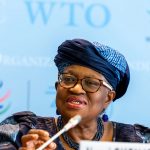Director-General of the World Trade Organisation (WTO), Ngozi Okonjo-Iweala, has underscored the importance of improving access to supply chain finance, stating it enables small businesses to grow and strengthens economic progress, especially in developing regions.
Speaking at a recent roundtable alongside multilateral development bank leaders at the World Bank Group and IMF annual meetings in Washington, D.C., Okonjo-Iweala highlighted the role of supply chain finance in integrating small businesses from developing nations into the global market. She praised the collaborative efforts of the WTO and the International Finance Corporation (IFC) in expanding supply chain finance access and endorsed next steps agreed upon by multilateral development banks to bolster this initiative.
Okonjo-Iweala noted, “The substantial work carried out by the WTO-IFC team over the past few years to improve access to supply chain finance, including advancing principles for green trade finance, digitalising trade finance, promoting services provided by correspondent banks, and providing technical assistance.”
The WTO DG observed that multilateral development banks have significantly increased their trade and supply finance support, scaling up from $30 billion annually before the COVID-19 pandemic to nearly $50 billion last year, aiding the distribution of essential goods such as food and medicine.
She pointed out that despite global growth in trade finance—now valued at approximately $2.3 trillion—many small businesses in developing countries still struggle to fully benefit. Hurdles include inadequate legal frameworks, limited technological infrastructure, and prohibitive costs.
According to Okonjo-Iweala, WTO research reveals that a 10 percent increase in the use of international factoring, a core supply chain finance tool for small businesses, can potentially boost trade by 1 percent. She noted that expanding access to such financing products can propel SME participation in trade.
“These efforts will help to make trade more inclusive and competitive, ultimately leading to greater gains from trade and higher development and poverty reduction outcomes,” Okonjo-Iweala said, emphasizing the need for financial institutions to increase the diversity of funding options available to small businesses.
Through enhanced access to supply chain finance, Okonjo-Iweala concluded, small businesses across Africa and other developing regions can drive economic inclusion and capitalize on global trade opportunities.










